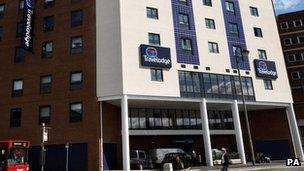Travelodge agrees deal to cut debts
- Published

Travelodge said the firm was now in a much stronger financial position
Hotel chain Travelodge has agreed a deal to cut its debts substantially, which it says will secure the long-term future of the business.
Some £235m of bank debt will be written off, helping to cut the total to £329m.
Three major investors will also inject £75m into the firm. Much of it will go into refurbishing 175 hotels, starting next year.
Travelodge also wants to find new operators for 49 hotels and pay greatly reduced rents on 109 more.
It said it would work with its landlords to try to find other businesses to take over the running of the hotels, in the hope of avoiding job losses.
Travelodge has been struggling with debts estimated at more than £1bn, but has been making profits on its day-to-day operations. It will now be given more time to pay off its remaining debts at lower interest rates.
It does not own its hotels and many of its leases were agreed at the peak of the property market before the 2008 financial crash.
Chief executive Grant Hearn said it was now in a much stronger financial position.
"This new appropriate level [of debts, interest payments and rental costs] will provide greater security for our staff, suppliers, landlords and developers," Mr Hearn said.
"This is a successful brand with millions of customers and the company will emerge in excellent shape from this process."
As part of the deal, control will pass from private equity firm Dubai International Capital, which bought Travelodge in 2006, to Goldman Sachs, GoldenTree Asset Management and Avenue Capital Group.
Dubai International Capital raised the money to finance the deal by issuing a £480m eurobond.
This debt was added to Travelodge's balance sheet, but will now by written off by the Dubai investment firm as part of the restructuring deal, further reducing its debts.
Deal concerns
The reductions in hotel numbers and rent payments are proposed as part of a Company Voluntary Arrangement (CVA), a legal process which helps companies reduce debts and outgoings. It has to be agreed by at least 75% of creditors, including landlords, suppliers and staff.
The struggling chain said there would be no changes to 347 hotels if the proposed changes went ahead, the majority of its 505-strong estate.
The British Property Federation gave a cautious welcome to the deal to save the UK's second biggest budget hotel chain, but expressed concern about CVAs.
Liz Peace, chief executive of the British Property Federation, said some landlords were being asked to "take a big hit" to keep a far bigger business afloat.
"We are becoming increasingly concerned with a system that creates such a range of winners and losers and allows advisers to dice and slice creditors to reach the required voting thresholds.
Rob Donaldson Head of Private Equity at the accountancy firm Baker Tilly thinks customers would have a better experience in the long term
"Such rules need reviewing and some greater sense of fairness restored," she said.
Accountancy firm KPMG,, external which is running the CVA, said landlords would get about 23.4 pence in the pound back. If Travelodge had gone into administration, they would just have received 0.2p in the pound, it said.
"We are constantly seeking to improve and evolve our CVA structures, based on feedback from the landlord community," Brian Green, restructuring partner at KPMG said.
"Accordingly, we are again including a 'clawback' mechanism for landlords, so they can share in the turnaround of the restructured company's future, and landlords are also being offered the option of lease extensions."